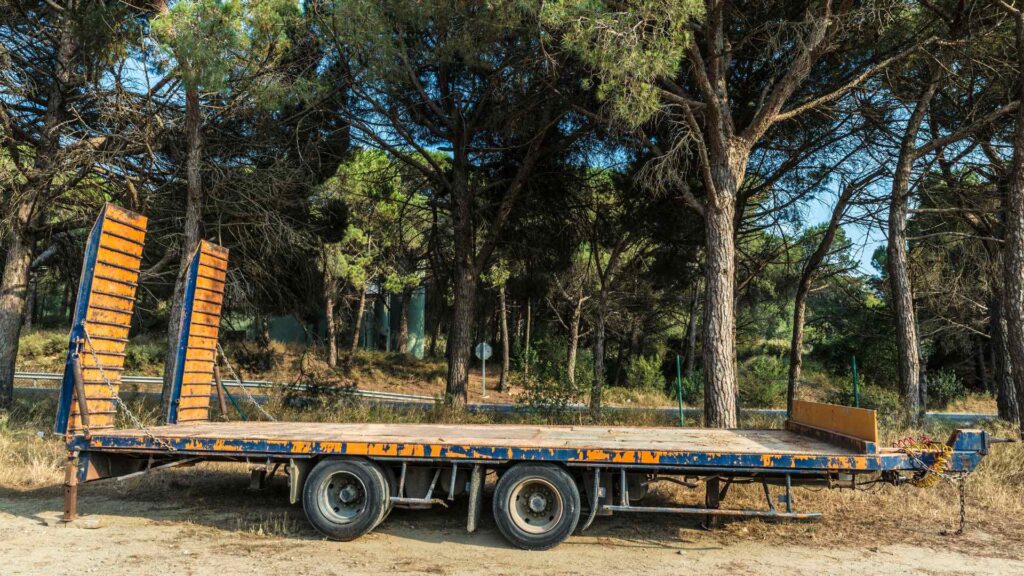Buying a Used Trailer? What You Need to Know Part 1
Eric Johnson2024-02-08T04:50:57-06:00
In this Article:
Buying a Used Trailer? What You Need to Know Part 1
Before You Begin Looking, Identify Your Specific Trailer Needs
What Size Used Trailer Do You Need?
What Is the Ideal Weight Capacity of Your Used Trailer?
The GVWR and the GAWR of the Used Trailer
How Big a Used Trailer Can Your Towing Vehicle Pull?
What You Should Know About the Hitch on Your Used Trailer
Where Are the Best Places to Look for a Used Trailer?
Next Up—Assessing the Used Trailer Before You Buy
We’re Treadworld, Home of the Best Trailer Tires Anywhere
Buying a Used Trailer? What You Need to Know Part 1
So, you’ve decided it’s time to make your work or play life easier by employing a trailer, and you’re thinking that getting a used utility trailer or a used cargo trailer makes more sense than buying a brand new one—due to the money you’ll save. Right? Right! But only if you do your due diligence and select a pre-owned trailer that checks all the boxes, so that you know you’re getting a work trailer or a play trailer that won’t require repairs and maintenance costs that will chew up all the savings, along with a good chunk of your time. That’s why the tire experts at Treadworld have put together these tips and information, to guide you in choosing the best trailer for you—one that’s used but with a lot of life left in it. With careful inspection, and by asking the right questions, you can make a good decision about your potential used trailer purchase.
NOTE: This is Part One of two. Here you’ll find help determining what style of used trailer you need, along with what size will be optimal for you, what weight capacity will serve you best, how to make sure your used trailer pairs well with your towing vehicle, and where you should begin your search for a used trailer. If you’d like more information regarding how to assess a potential used trailer to be sure it will provide you with years of dependable service, see part two, Buying a Used Trailer? How to Make a Reliable Assessment.
Before You Begin Looking, Identify Your Specific Trailer Needs
Your first step when buying a used trailer is to determine your needs and wants. Are you looking for a commercial trailer or a personal trailer? Will you be best served by a utility trailer for hauling equipment, or a travel trailer that will facilitate family camping trips? Will a cargo trailer—an enclosed trailer that provides protection for your load—work best? Do you need a horse trailer? Or a motorcycle trailer? Or a snowmobile trailer? Or a car hauler? Identifying your needs is number one. Once you have determined the purpose of the used trailer, you can start to consider other factors such as size, weight capacity, and type of hitch. How often do you expect to use the trailer? Will you need to access the contents of the trailer frequently, or will it be used for long-term storage? You’ll also need to factor in the type and size of the vehicle that will be doing the towing. Thinking through answers to these questions will help define the style and specifics of the used trailer that will be best for you.
What Size Used Trailer Do You Need?
Determining the size of the used trailer you need will depend on the type of cargo or equipment you plan to transport. Consider the dimensions of the largest item you’ll be carrying, and add a few inches on all sides to ensure a safe, comfortable fit. Then, consider the square footage you’ll need for other gear, equipment, tools, and supplies. Keep in mind that a towable trailer that is larger will require more powerful vehicles to tow it (see below).
What Is the Ideal Weight Capacity of Your Used Trailer?
The weight capacity of the used trailer you’re considering buying is another important factor. You need to make sure that the trailer can safely carry the weight of your planned cargo or equipment—which means you’ll need a weight estimate of your cargo, whether you expect it to consist of the same equipment you’ll take from job to job, or the weight of a load you will put on and take off. Your best bet will be to add a buffer zone to the weight determination to ensure safety. To determine the weight capacity of the trailer, you need to look at the Gross Vehicle Weight Rating (GVWR) and the Gross Axle Weight Rating (GAWR) of the trailer.
The GVWR and the GAWR of the Used Trailer
The GVWR is defined as the maximum weight that the trailer can safely carry, including the weight of the trailer itself, and the cargo. This weight rating is determined by the manufacturer and is usually displayed on a plate or sticker affixed to the trailer itself—typically located near the front of the trailer, on the tongue or frame. Or, you should be able to find the information in the owner’s manual. To determine the weight capacity of the trailer, you need to subtract the weight of the trailer from the GVWR. It is important to ensure that the weight of the cargo being transported, combined with the weight of the trailer itself, does not exceed the trailer’s GVWR, as that situation can be dangerous and may cause damage to the trailer or towing vehicle, as well as potentially causing accidents on the road.
The GAWR is the maximum weight that the trailer’s axles are designed to support and can safely carry. It represents the maximum distributed weight that can be loaded onto each individual axle of the trailer without exceeding the manufacturer’s specifications. This information will typically be on the same sticker, or in the same section of the owner’s manual, as the GVWR information.
It’s important to note that the GVWR and GAWR are related but distinct weight ratings. While the GVWR represents the maximum weight that the entire trailer can safely carry, the GAWR is the maximum weight that can be loaded to maintain safety with regard to the axles. It is essential to ensure that the weight of the cargo being transported is distributed evenly across the axles of the trailer, and does not exceed the GAWR for any individual axle.
How Big a Used Trailer Can Your Towing Vehicle Pull?
Before buying a used trailer, it is crucial to ensure that it will be compatible with your tow vehicle. To that end, you will also need to know the GCWR (gross combined weight rating) of your towing vehicle—the maximum weight your vehicle can safely carry and pull. This can be calculated by adding the vehicle GVWR—the heaviest your vehicle can weigh, including driver, passengers, fuel, accessories and cargo, and still remain safe—and the gross trailer weight (GTW), which does not include the tongue weight, passengers, and cargo. These measurements should also be available either on a plate in the vehicle itself, or in the owner’s manual. Knowing how much weight your towing vehicle can safely carry and tow is essential to selecting a used cargo trailer or used utility trailer that is the right size and weight for your needs, whether you are hauling freight across the country or delivering or working locally.
What You Should Know About the Hitch on Your Used Trailer
When considering a used trailer, there are several things you should know about the trailer hitch to ensure that it is suitable to be used with your vehicle, and to meet your towing needs. Trailer hitches come in different classes based on their weight capacity. Class I hitches have the lowest weight capacity (up to 2,000 lbs.), while Class V hitches have the highest weight capacity (up to 20,000 lbs.).
You will need to know the tongue weight capacity (TWC) of your vehicle, which is the maximum vertical weight—the amount of weight pushing down on the ball—that the hitch can support during normal driving conditions. If your towing vehicle came equipped with a factory-installed hitch, it likely includes information specifying the TWC for both your vehicle and your hitch, and they are generally the same. If the hitch wasn’t factory-installed, you may find one TWC for the vehicle and another TWC for the hitch. In that case, go with the lowest TWC for safety’s sake.
Additionally, the trailer’s hitch coupler needs to match the hitch receiver size. Common sizes are 1-7/8 inches, 2 inches, and 2-5/16 inches. Plus, the height of the hitch needs to be adjustable so that the trailer will be level when attached to your vehicle, and the appropriate wiring to connect the trailer’s lights and brakes to your towing vehicle’s electrical system is essential.
Where Are the Best Places to Look for a Used Trailer?
There are a number of places you can check when you’re ready to look for a used trailer in your area, including:
- Online Classifieds. Many places allow you to search for trailers based on your location and budget, and often include photos and descriptions. You can check your local newspaper or online classified ads, or websites such as Craigslist, eBay, and Facebook Marketplace.
- Local Dealerships. Check local trailer dealerships to determine if they have any used trailers, possibly trade-ins or consignment trailers, for sale.
- Online Auctions. You may be able to find online auctions for used trailers on auction websites.
- Trailer Rental Companies. Some trailer rental companies sell their used trailers after they are retired from the rental fleet.
- Online Trailer Forums. It won’t take much searching to find many online forums dedicated to trailers and trailer ownership. Some of these forums may have classified sections where members can buy and sell trailers, but they all should be good for providing advice and tips on where to find the right trailer.
Next Up—Assessing the Used Trailer Before You Buy
Part 2 of this article (Buying a Used Trailer? How to Avoid Mistakes) will provide you with suggestions for carefully assessing the different components of the used trailer before you buy—including the brakes, bearings, frame, flooring and ramps, suspension, exterior, and of course, the most important component of any used trailer, the parts of the trailer that meet the road, the trailer wheels and trailer tires.
We’re Treadworld, Home of the Best Trailer Tires Anywhere
When you’re looking for new trailer tires, or a spare trailer tire, or tire and wheel combos, count on us here at Treadworld to provide you with the high-performing, long-lasting trailer tires you can depend on for the long haul—in a wide range of styles and a huge selection of sizes. All our RubberMaster Trailer Tires are manufactured to strict tolerances from top rubber compounds, then triple-tested for quality, balance and uniformity before being X-rayed to be sure they’re perfect. All our dent-proof, crack-proof and virtually indestructible SteelMaster Wheels are manufactured from tough, durable steel then put through several quality checks to ensure dependable quality. Expect easy ordering, and fast shipping, plus your satisfaction is guaranteed with our no-hassle Ultimate Advantage Warranty. Don’t hesitate to contact our tire experts via live chat or email with any questions you may have, and to get the ideal trailer tires—or the perfect ATV tires, UTV tires, lawn and garden tires, agriculture tires and many others—from our extensive selection. Or use our Treadworld Product Selector Tool to help you find exactly what you want, on our home page.
